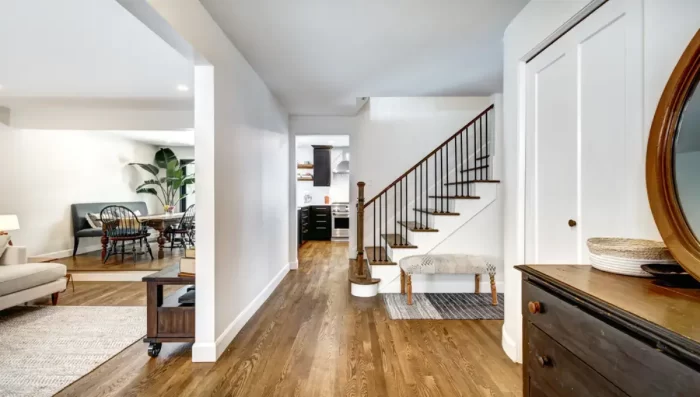Are you planning to reconstruct your flooring and looking for some tips on how to install vinyl flooring and the average cost of vinyl flooring This article is for you if you have no idea about this.
The cost, flexibility, and longevity of vinyl flooring have made it a popular option for homeowners. Vinyl flooring can be the ideal solution for any home improvement project, whether it is your kitchen, bathroom, or another area.
You can select from a broad variety of shapes and designs that resemble natural materials like hardwood, stone, or ceramic tiles thanks to their genuine appearance and feel. It’s not just simple to keep clean and maintain, but it’s also a stain-, scratch-, and gaping hole.
Yes, Although the price to install vinyl flooring can vary, it is typically seen as a cost-effective option. Installation of vinyl flooring typically costs between $2 and $7 per square foot, including labor and materials. Consequently, it is a more affordable option than other flooring materials like hardwood, stone, or ceramic tile, which can be more expensive to install. The type of vinyl flooring, the size of the room, and the installation’s intricacy are just a few variables that will affect how much it will ultimately cost.
- how to install vinyl flooring?
- how much average cost to Install Vinyl Flooring Yourself?
- how to break down the cost of Vinyl Flooring Installation?
- how many types of vinyl flooring is?
- compression between vinyl tile and luxury vinyl tile
- it's important to consider the following factors When buying vinyl flooring
- FAQs about vinyl flooring
- Tell Us In The Comments As Per You this information is helpful.
how to install vinyl flooring?
Here are some general guidelines for installing vinyl flooring.
- Prepare the surface: Make sure the subfloor is completely clean, level, smooth, and debris-free.
- calculate the size of the room: To calculate how much vinyl flooring you’ll need, measure the room’s length and width.
- Cut the vinyl flooring: Make sure to provide a minimum of 1/4 inch of expansion space around the room’s perimeter when cutting the vinyl flooring to size.
- Lay the underlayment: Lay a foam underlayment if required to provide the vinyl flooring with a smooth, level surface.
- Apply the adhesive: As instructed by the manufacturer, apply adhesive to the subfloor and the back of the vinyl flooring.
- Lay the vinyl flooring: Lay the vinyl flooring commencing in one corner of the room and gradually moving out, putting pressure firmly and getting rid of any air bubbles.
- Trim the edges: Trim the vinyl flooring’s borders to fit around obstructions like baseboards and entrances.
- Finish the edges: Cover the expansion space with edge trim or quarter-round moldings to give the vinyl flooring a polished appearance.
how much average cost to Install Vinyl Flooring Yourself?
Depending on the type of vinyl flooring you selected, the size of the area, and the resources you’ll really have to execute the job, the cost to install vinyl flooring yourself can fluctuate. On average, vinyl flooring prices are between $1 and $5 per square foot, plus tools and supplies like sub-floor, adhesives, and gloss can cost an extra $200 to $500.
It’s essential to keep in mind that DIY installation can be difficult and time-consuming, especially if you have no prior knowledge of laying flooring. It may be advisable to employ a specialist flooring installation if you’re unsure that you can finish the process.
how to break down the cost of Vinyl Flooring Installation?
Vinyl flooring installation costs can vary depending on a variety of variables, including.
- Size of the room: The cost of installing vinyl flooring might go up when more materials and labor are needed for larger rooms. It should come as no surprise that the installation of vinyl flooring will cost you the most money per square foot. Generally speaking, a larger room will cost more money. For larger works, some pros will provide lower per-foot pricing. A 200-square-foot room costs $1,000, or around $5 per square foot on average.
- Type of vinyl flooring: The quality, style, and thickness of the vinyl flooring can have a significant impact on the price.
- Preparation work: The price will go up if the current flooring needs to be taken out or the subfloor needs to be fixed.
- Labor costs: The nature of the project, the installer’s knowledge, and the location can all impact the cost of labor. A skilled vinyl floor installation will charge anything between $3 to $10 per sqft for labor alone and if you decide against doing it yourself. Glue-on planks will cost more per foot than boards with far less difficult installation alternatives, including floating floors. For the construction of vinyl flooring, you may also get a price of about $36 per hour. Remember that staircases or rooms with unusual shapes will increase the cost.
- Materials and tools: The price of the installation as a whole may also include the cost of the tools, adhesives, and any other materials.
how many types of vinyl flooring is?
There are various kinds of vinyl flooring, such as. The ideal option will rely on the specific requirements and tastes of the homeowner. Each type of vinyl flooring has its own features and advantages.
1. vinyl plank and its cost per sqft
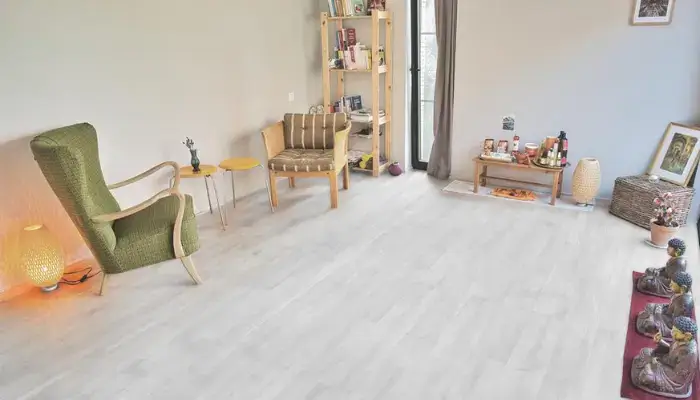
Due to their dependability, adaptability, and affordability, vinyl planks are a common choice for flooring. They come in a range of hues, patterns, and textures and are composed of a flexible vinyl substance meant to imitate hardwood floors.
The size of the space, the kind of vinyl planks used, and any needed preparation work will all impact how much it will cost to install vinyl planks. Vinyl plank installation can cost anywhere between $2 and $7 per square foot on average, with a cost per square foot of about $3 to $5. The real cost will vary depending on the details of each project; this is only an estimate.
Vinyl planks are a terrific alternative for money-conscious homeowners because, despite the cost of installation, they provide a low-maintenance and cost-effective flooring option for any home.
2. Vinyl tiles and their installation cost per sqft
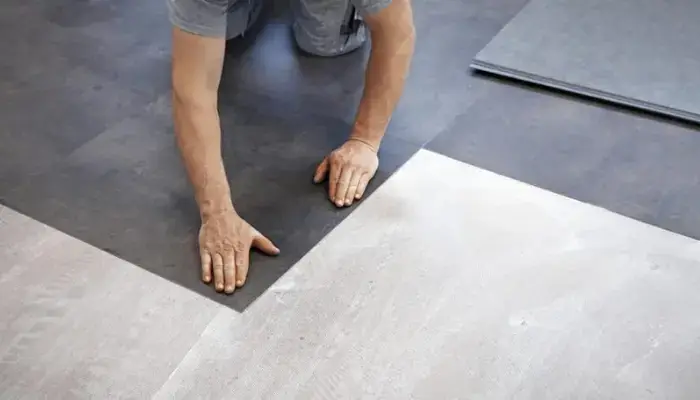
Due to their affordability, adaptability, and durability, vinyl tiles are a common flooring choice for homes. They are constructed of flexible vinyl material and are offered in a range of hues, designs, and textures so that homeowners can select the appearance that most closely matches their decorating aesthetic.
The size of the space, the kind of vinyl tiles used, and any necessary preparation work will all affect how much it will cost to install vinyl tiles. Vinyl tile installation typically costs between $3 and $5 per square foot, with costs ranging from $2 to $7 per square foot on average.
The real cost will vary depending on the details of each project; this is only an estimate. Vinyl tiles offer a low-maintenance and cost-effective flooring alternative for any home, despite the cost of installation, making them a wonderful option for homes on a tight budget.
Vinyl tiles are a long-lasting flooring option for any room in the house and may last for many years with careful installation.
3. Vinyl sheet and their installation cost per sqft
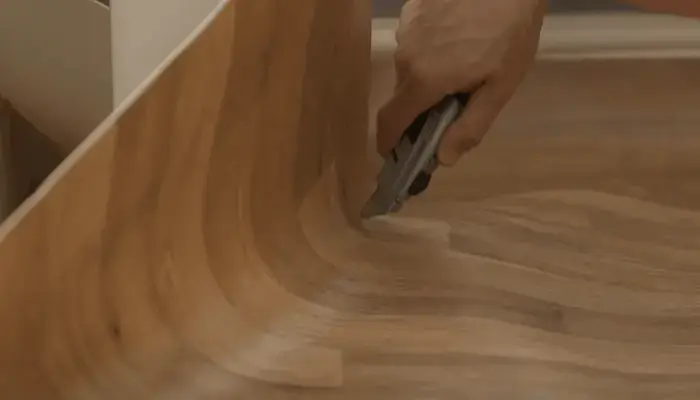
It is possible to cover an entire floor with vinyl sheet flooring, which is one continuous piece of vinyl material. It provides a continuous appearance and is perfect for big spaces without seams or transitions. Vinyl sheet flooring installation typically costs $2 to $5 per square foot, including labor and supplies.
The size of the room, the type of vinyl used, and any necessary preparation work will all affect the final price. Vinyl sheet flooring is a low-maintenance, economical flooring solution that can last for many years, despite the installation costs.
4. Luxury vinyl tiles (LVT) and their installation cost per sqft
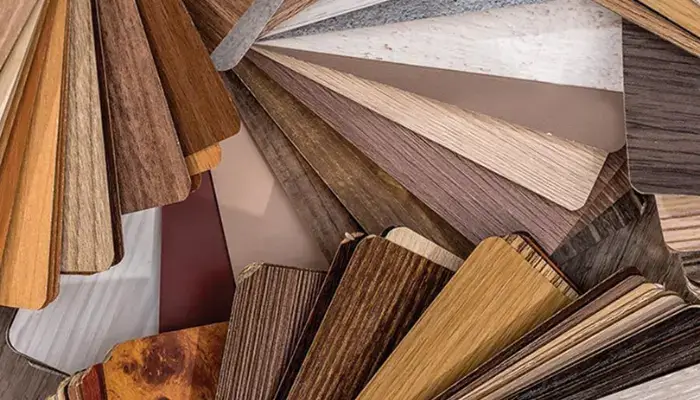
High-end vinyl tiles that imitate the appearance of natural materials like stone or wood are known as luxury vinyl tiles (LVT). They are available in many different designs and colors, and they provide a more upscale appearance than regular vinyl tiles.
Including labor and materials, the price to install LVT can be anywhere from $3 and $7 per square foot. The size of the space, the LVT type used, and any preparation work needed will all affect the final price. LVT offers a resilient, low-maintenance, and beautiful flooring solution for any room in the house, despite the installation costs.
5. Vinyl composition tile and their installation cost per sqft

Frequently employed in commercial settings, vinyl composition tile (VCT) is a form of vinyl tile. It is a well-liked option for high-traffic areas since it is long-lasting, low-maintenance, and simple to clean. Between $2 and $5 per square foot, including time and materials, can be spent implementing VCT.
The size of the space, the VCT type used, and any necessary preparation work will all influence the final price. VCT offers a cost-effective and long-lasting flooring solution for any commercial space, notwithstanding the installation costs.
compression between vinyl tile and luxury vinyl tile
There are some significant distinctions between vinyl tiles and luxury vinyl tiles (LVT), two different forms of vinyl flooring.
In domestic settings, vinyl tiles are typically chosen because they are more basic. Although they come in a wide range of colors and designs, there is often a small number of finishes and textures. Budget-conscious homeowners frequently choose them since they are frequently more affordable than LVT and simpler to install.
Inversely, LVT is a more expensive choice that is intended to resemble the appearance of real materials like stone or hardwood. In comparison to regular vinyl tiles, they provide a greater variety of surfaces and textures as well as a more elegant appearance. They cost more than vinyl tiles and often take more skill to install, but they are a common option for homeowners seeking a more upscale appearance.
Overall, the decision to choose vinyl tiles or LVT will be based on the project’s unique requirements, price, and intended aesthetic.
Renew your effort
it’s important to consider the following factors When buying vinyl flooring
- Purpose: The flooring’s use and the kind of usage it will see should be determined. By doing so, you’ll be able to select a flooring solution that meets your needs and is both reliable and sturdy.
- Style: Pick a look that enhances the appearance of your area while complementing your decorating style. You can pick a style that appeals to you because vinyl flooring is available in a wide range of hues, designs, and textures.
- Installation: Choose the solution that best suits your unique demands by taking into account the type of installation required for each type of vinyl flooring. Make important to select the vinyl flooring type that is most appropriate for your project because some varieties of vinyl flooring are simpler to install than others.
- Maintenance: Choose the vinyl flooring option that is the simplest to maintain and care for by determining the level of upkeep necessary for each type of vinyl flooring. Vinyl flooring comes in a variety of styles, some of which require little upkeep and others that would.
- Budget: The budget you have set up for your flooring job should be considered. Compared to other flooring options, vinyl flooring is usually more economical, though the price can change based on the style you select.
FAQs about vinyl flooring
q.1 what is the perfect thickness of vinyl flooring?
Ans: Depending on the kind, the ideal vinyl flooring thickness typically falls between 2 and 5 millimeters. Although more expensive, thicker vinyl flooring offers superior stability and durability.
q.2 is vinyl flooring long-lasting?
Ans: Depending on the caliber of the materials utilized and the quantity of upkeep given, vinyl flooring may endure a long time. While low-quality goods might need to be replaced more quickly, high-quality vinyl flooring can survive for many years. Your vinyl flooring can live longer with the right care and upkeep.
q.3 Can Vinyl Flooring Withstand Heavy Weight?
Ans: The thickness and quality of the vinyl material determine the vinyl flooring’s capacity to support significant weight. A great option for high-traffic areas is thicker, higher-quality vinyl flooring because it can bear heavy weight better.
q.4 can vinyl flooring be installed over tile?
Ans:
Tell Us In The Comments As Per You this information is helpful.
Additionally, don’t forget to read the other post on ideas for making houses, which will definitely provide you with an insightful and helpful perspective.
